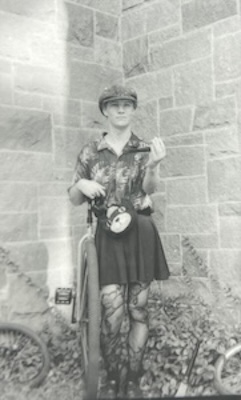
This is an installment of the Artgus Artist Spotlight, an ongoing series presented by the Arts & Culture section, intended to highlight the artistic talents of the wider Wesleyan community. To nominate a student artist or group, email argus@wesleyan.edu.
In this installment, The Argus spoke with Bartek Alicki ’26. Alicki is a circus artist who recently founded WesCirque, a club focused on developing circus skills and acts with the intention of a final performance. Alicki shared their extensive background with the circus, their performance experience on campus, and their goal in creating WesCirque.
The Argus: Can you introduce yourself?
Bartek Alicki: I have been a Middletown resident my whole life. I am now [pursuing] the computer science [and] philosophy majors, and the Human Rights Advocacy minor.
I have been part of the Middletown Children’s Circus since I was eight years old. Now that I’ve aged out of it, I’m basically what one might describe as a camp counselor, where I teach the children [in the program]. I started the club [WesCirque] so I can keep on teaching and spread the love and joy [of circus].
A: When did you first get interested in the circus and circus acts?
BA: I first started getting into it around six years old, when I heard and saw different circus performers in the area because of the Middletown Children’s Circus, [which] is an extracurricular program that is advertised in the community. My parents just asked if I was interested one day, since it was something that looked like it could be fun and I could do it for the summer. And I was like, “Sure, I’ll do it.”
From the get-go, I always had an interest in juggling. I thought juggling was the coolest of the disciplines that were offered, even though I wasn’t very good at it when I was eight years old. It turns out that—I found this out way later—I have a deficit in both fine and gross motor skills. But, I do a lot of things that most people would think would indicate the contrary. I guess it just shows that I like to be challenged.
The big unicycle I have I actually got my freshman year as I was coming into school. There was an email that was sent out that was like, “FGLI students, if you need money for transportation, you can submit an email here.” I was like, “Okay, I need money for transportation,” and they gave me the amount of money required to buy a unicycle. I’ve ridden it to class every day since then. I’ve never been a super big unicycler, but I made the commitment. I got the uni[cycle] thinking, “You know what, it’s a fun way to get to class, it’s a nice challenge, and that’s how I’m gonna get better.” The first time, I think it took me like an hour to get to class.
A: When you unicycle around campus, do you consider it a performance or just a means of transportation?
BA: It’s both. It’s interesting because it serves as a reminder to my roots to the circus and the kind of philosophy that it adopts: to play with the boundary between performer and audience. People tend to interact with me as a performer, but [they] forget they’re an audience when they do so. When I respond to them, they’re like, “whoa,” but also, they wanted me to respond to them. It’s very interesting and fun to play with those boundaries.
A: How would you overall rate your unicycle and circus experience on campus these last years?
BA: There’s a lot of good audience members, and there’s not so good audience members. Riding a unicycle is my means of transportation. I recognize I am in a position of performance by using it, but sometimes it’s unfortunate that I don’t get to opt out of that. I get it, though—it’s a cool and novel thing for most people, and I love to share what I’m interested in. I’m usually not bothered, but sometimes there are people who will yell out to me to do things. My first year here, it felt more [like] I was ostracized for my circus interests, but I didn’t change a damn thing other than do it more and own it. And then, by sophomore year, people were like “Wait, this is kind of cool,” and then I became a kind of micro-celebrity.
A: Can you talk more about WesCirque?
BA: It’s a recent inception that finally came off the ground. It’s now a formal group, and we just got conditionally approved for funding. I want to be able to get props [for the club] because the club, as of right now, is only operating with the props I have.
Everyone can be involved [in the circus]. If you have a cool talent, I want to put you on stage [so] you can show off this cool thing. In the past, as I was doing things, people [would] come up and ask, “How did you learn this? Is there a club?” And now that I actually have the club, I can direct them.
A: What are your future plans for the club?
BA: There are no performance [dates] set yet. It would be fun, at minimum, to have one big performance at the end of the year. It’s just a matter of finding the people who would be willing to make the commitment.
A: Is there anything else you want to add?
BA: The circus is by and for everyone. Everyone is always welcome, even if you just want to drop by and watch stuff. Anyone can learn and anyone can do it. I’ve struggled, and I’ve come a long way since I started.
This interview has been edited for length and clarity.
Maggie Smith can be reached at mssmith@wesleyan.edu.



Leave a Reply